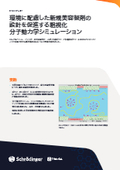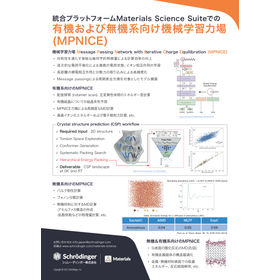Free Webinar: Cosmetics Development Utilizing Digital Chemistry, February 19
Physics-based simulation and machine learning software for a wide range of users, from beginners to experts in computational chemistry.
Schrödinger, Inc. will hold a webinar for materials science on February 19 (Wednesday) titled "Virtual testing of personal care and cosmetics formulations using digital chemistry methods." The development of sustainable products faces many challenges, requiring time, resources, and new raw materials. Predictive modeling is gaining attention to streamline this process. It allows for the identification of promising ingredients and formulations that meet standards, as well as new packaging materials, providing molecular-level understanding through virtual testing using computational methods. Specifically, it enables the analysis of the behavior of individual components, the form of formulations, stability, and interactions with biological surfaces. Additionally, it allows for the exploration of interactions between products and packaging materials, helping to identify factors that significantly affect shelf life. In this seminar, we will demonstrate through case studies how computational chemistry can assist in product development, container design, and analysis during product use. We invite you to join us without hesitation.
basic information
Product Group Desmond: Predicts various material properties such as glass transition temperature, water absorption rate, Young's modulus, refractive index, and dielectric constant using high-speed molecular dynamics (MD) programs. AutoQSAR: Enables the construction and application of machine learning models to easily predict the physical properties of organic molecules through an automated workflow. MS CG LiveDesign: An AI platform for materials informatics. OPLS4: Proprietary high-precision force field parameters. Jaguar: A rich automated quantum mechanics calculation workflow. *For more details, please refer to the PDF document.*
Price information
For more details, please feel free to contact us.
Delivery Time
Applications/Examples of results
For more details, please refer to the PDF document or feel free to contact us.
Related Videos
catalog(2)
Download All CatalogsNews about this product(2)
-

February 19 (Wednesday) "Free Web Seminar" Personal Care and Cosmetics Development Utilizing Digital Chemistry
Schrödinger, Inc. will hold a webinar for materials science on February 19 (Wednesday) titled "Virtual testing of personal care and cosmetics formulations using digital chemistry methods." The development of sustainable products faces many challenges, requiring time, resources, and new raw materials. Predictive modeling is gaining attention to streamline this process. It allows for the identification of promising ingredients and formulations that meet standards, and provides molecular-level understanding through virtual testing using computational methods. Specifically, it enables the analysis of the behavior of individual components, the form of formulations, stability, and interactions with biological surfaces. Additionally, it allows for exploration of the interactions between products and packaging materials, helping to identify factors that significantly affect shelf life. In this seminar, we will demonstrate through case studies how computational chemistry can assist in product development, container design, and analysis during product use. We invite you to join us!
-

June 4 (Tuesday) to June 7 (Friday) - Free Web Seminar: Introduction of case studies on simulation software for materials science and the use of materials informatics.
Schrödinger, Inc. will hold a materials science web seminar titled 'Schrodinger Materials Science Seminar Japan 2024' from June 4 (Tuesday) to June 7 (Friday). In recent years, computational chemistry has established itself as an essential foundational technology in the development of various materials, ranging from semiconductors and electronic components to everyday products. Since its founding in 1990, Schrödinger has continuously worked on enhancing software and informatics for molecular design, providing practical solutions for the efficiency of various material developments. We will be hosting a seminar to introduce case studies utilizing these software tools. The content will be satisfying for both those with experience in simulations and machine learning, as well as those who are just starting out. We welcome participation in any sessions of interest, so please feel free to join us.
Recommended products
Distributors
Schrödinger Co., Ltd. is the Japanese subsidiary of Schrödinger Inc., headquartered in New York, USA. Schrödinger has a history of about 30 years in developing software that integrates advanced technologies in chemistry and computer science, primarily in the fields of materials science and life sciences, providing advanced solutions for drug discovery, biologics, and materials research and development.









































